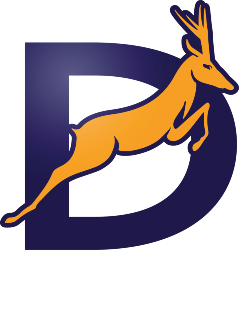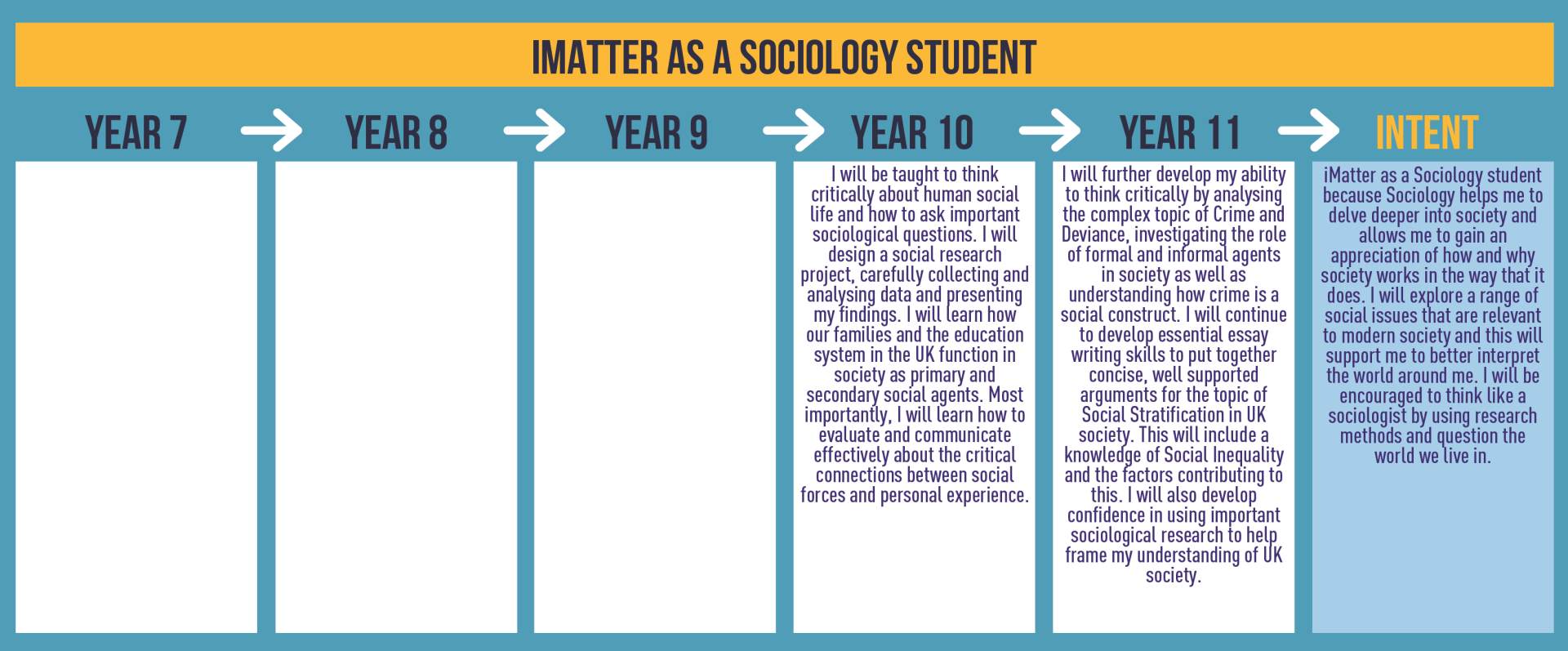Sociology
Year 10 Curriculum plans
| Term | What are we learning? | What Knowledge, Understanding and Skills will we gain? | What will excellence look like? | How will these be assessed? |
|
Autumn |
Introduction to Sociology |
Students are introduced to key concepts as well as debates within sociology. Students will learn concepts such as socialization, culture, norms, deviance, power and social institutions. Students are introduced to key classical sociologists such as Marx, Durkheim and Weber. Students will be introduced to different sociological perspectives on social structures, social processes and social issues, including those informed by: feminism, functionalism, interactionism and Marxism. Students will learn how to apply these perspectives to analyse and explain social phenomena. |
Students will demonstrate a strong grasp of the key concepts and debates within sociology, as well as the ability to apply sociological perspectives to real world- examples. Students can explain and critically evaluate the ideas of classical sociologists such as Marx, Durkheim and Weber. Students can demonstrate nuanced understanding of the different sociological perspectives and how they offer different explanations of social structures, processes and issues. Students are able to critically evaluate, compare and contrast theories or explanations. Students can debate contemporary social issues in order to be able to challenge everyday understandings of social phenomena from a sociological perspective. |
Teachers will be using formative assessment to assess students’ knowledge and understanding in lessons. Students will complete an end of unit assessment which will assess their application of knowledge and understanding of sociological theories and concepts. |
|
Autumn |
Research methods |
Students will identify, describe and explain various methods and methodological issues that are used to study human behaviour. Students will gain an understanding of the importance of research methods in social research and the role of ethics in conducting research. Students will learn about different research methods such as experiments, surveys, interviews, participant observation and secondary data analysis. They will also learn how to design and conduct research projects, including selecting appropriate research methods, sampling techniques and data analysis methods. They will be able to identify and explain the advantages and disadvantages, strengths and weaknesses of a particular method for a specific area of research. Students will learn how to interpret data. | Students can demonstrate an understanding of the process of research design for a specific area of research, including practical difficulties, ethical issues and apply this knowledge to design and conduct their own research projects. They should be able to explain the importance of ethics in research. Students have an understanding of the relevance and usefulness of various primary and secondary sources for a specific area of research. They should be able to critically evaluate different research methods and identify the strengths and weaknesses of each method for a particular research question. Students can demonstrate an ability to interpret data presented in a variety of forms and draw conclusions based on their analysis. | Teachers will be using formative assessment to assess students’ knowledge and understanding in lessons. Students will complete an end of unit assessment which will assess their application of knowledge and understanding of sociological theories, concepts, evidence and methods. |
|
Spring |
Family |
Students will explore the functions of families and how family forms differ in the UK and globally. Students will gain knowledge of how relationships changed within families over time. They will contrast a variety of sociological perspectives on changing relationships within families. They will further explore the different criticisms of families, the consequences of divorce and explain the reasons for the rise in divorce in the last 70 years. | Students can explain the functions of families and contrast a variety of sociological perspectives on the functions of families such as functionalist, feminist and Marxist. Students can explain various family forms and how relationships within families have changed over time. They can describe contemporary family related issues, consequences of divorce for family members and explain the pattern of divorce in Britain since 1945 using relevant statistical data. | Students will complete a mid-unit and an end of unit assessment. They will be assessed on their knowledge and understanding of the topic and how they can analyse and evaluate sociological theories, concepts in order to construct arguments and make judgements. |
|
Summer |
Education |
Students explore the different views of the role and functions of education. Students will gain knowledge of the factors that affect educational achievement including, streaming, setting, mixed ability teaching, labelling and the self-fulfilling prophecy. They will explore the work of Halsey and Ball on class-based inequalities and teacher expectations. Students will be able to describe, compare and contrast a variety of sociological perspectives on these issues (Interactionist, Functionalist, Feminist and Marxist). | Students can explain the functions of education and describe a variety of different types of schools. Students can compare and contrast a variety of sociological perspectives on education. They can explain various factors affecting educational achievement including class, gender and ethnicity. They can explain various processes within schools affecting educational achievement such as setting, labelling and self-fulfilling prophecy. | Formative assessment: Teacher uses strategies during discussion and tasks to assess pupils understanding of the subject. Students will complete an end of unit assessment. They will be assessed on their knowledge and understanding of the topic and how they can analyse and evaluate sociological theories, concepts in order to construct arguments and make judgements. |
Year 11 Curriculum plans
| Term | What are we learning? | What Knowledge, Understanding and Skills will we gain? | What will excellence look like? | How will these be assessed? |
|
Autumn |
Crime and deviance |
Students will learn about the nature of crime, deviance and social control. They will develop an understanding of the relationship between crime, power and social inequality, as well as the ways in which crime and deviance are socially structured. Students will investigate the work of Merton on the causes of crime from a functionalist perspective and Becker from an interactionist perspective. Students will gain knowledge of formal and informal methods of social control. They will explore the factors affecting criminal and deviant behaviour. They will further develop skills such as analysing the usefulness of the main sources of data on crime. Students will gain knowledge of the patterns and trends in crime figures and the ‘dark figure’. | Students can show an understanding of the role of formal and informal agents in dealing with crime and deviance. They will demonstrate knowledge of how the main theorists see this in society. They can link theorists to different viewpoints about modern crime in the UK. Students will be able to identify different types of crime and explain their social and economic causes. They will be able to explain the impact of social inequality, power and social control on the incidence of crime and deviance. Students will be able to critically evaluate the usefulness of different sources of data on crime, such as official statistics and victim surveys. |
Teachers will be using formative assessment to assess students’ knowledge and understanding in lessons. Students will complete an end of unit assessment. They will be assessed on their knowledge and understanding of the topic and how they can analyse and evaluate sociological theories, concepts in order to construct arguments and make judgements. |
|
Spring |
Social Stratification |
Students will be continuing and consolidating their learning about Social Stratification, analysing how society is structured based on socio-economic class and other divisions, such as ethnicity, gender, disability and age. They will also be able to describe, compare and contrast the main theories on these factors.They will then begin to analyse the impact these factors can have on an individuals lifestyle and life chances. | Students will be able to use sociological theories and evidence to compare and contrast social issues, construct reasoned arguments and debates, make substantiated judgements and draw conclusions.They will also be able to draw connections between the different topic areas studied. | Formative assessment: Teacher uses strategies during discussion and tasks to assess pupils understanding of the subject. Students will complete an end of unit assessment. They will be assessed on their knowledge and understanding of the topic and how they can analyse and evaluate sociological theories, concepts in order to construct arguments and make judgements. |






